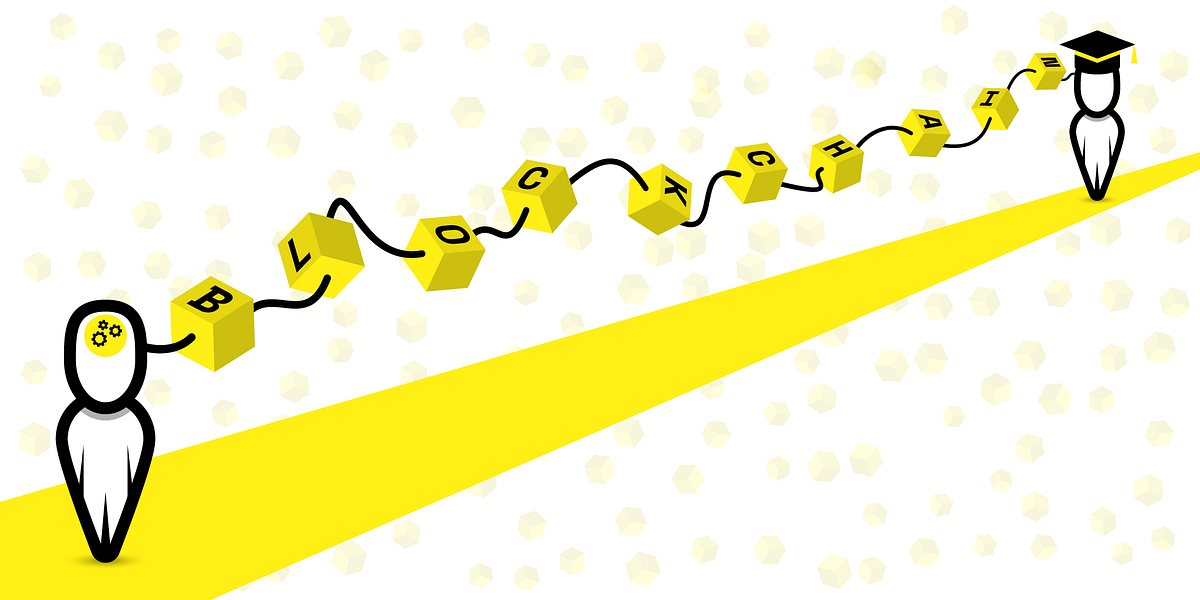Disclaimer: Neither District 3 nor myself endorse or hold shares, coins or tokens in any of the companies and blockchains discussed in this article.
The blockchain could allow any individual to issue proof that another person can perform a skill. This can then be traced to see whether or not that person got hired for that skill, and further reinforce that the issuing individual made a good decision.
Picture this:
Two people, Mark and Sarah. They both teach three different people the same skill of brewing coffee. All six of those people apply to a variety of coffeeshops and at the end, we found that two of Mark’s students got hired, whereas none of Sarah’s did. This gets registered on the blockchain. Two months later, a new coffee enthusiast, Lucy, wants to learn how to become a barista. She looks around to see who can teach her and finds both Mark and Sarah. Lucy will go on a website, enter the ID of both teachers and see how many of their students were successfully employed in that skill.
What’s powerful about this, and how that is different from a simple review on Google about Mark or Sarah as tutors, is that the blockchain is immutable. This means that neither of them can simply pay 100 people to give them a good review. The blockchain would have on it a log of when Mark first got paid by a student, when he stopped getting paid, and when the student got employed. If someone meets mark on May 1st, graduates on May 2nd, and gets employed that afternoon — something is up.
The incredible thing is that there are companies that exist today who are working on such ideas. One group looking to make a decentralized education network called NTOK.

They’re currently in alpha and testing their concept with the teaching of foreign language, but they eventually plan to roll out to primary and secondary school level education. Some of the unique activities that they are able to do because of the blockchain is in their pricing and accessibility. As this article about them says:
NTOK’s platform will champion the idea of “tokenizing talents,” where students can buy tutor hours in bulk at a fixed price — preventing services from getting more expensive in the future. The company says this also allows tutors to “pre-finance their personal development.” It believes this concept will help evolve the current business and existing operations into a “three-level Blockchain infrastructure for continuing, lifewide education.”
Another blockchain company called ODEM goes beyond referring to themselves as a school or tutoring network and calls themselves an “On-Demand Education Marketplace”

ODEM uses artificial intelligence to seamlessly manage complex requests, organizing complete educational programs around the world. Once programs are entered into by students and educators, ODEM smart contracts seamlessly manage payments from beginning to the end of long-term engagements.
This would effectively mean that a computer algorithm will stitch together courses from different instructors and pair them with the right group of students to form a hacked together classroom.
The last company I’d like to point at is Education Ecosystem.

Their big claim is that anyone can upload videos of how to make products and students can follow along and learn to build virtually anything.
Their first product, LiveEdu, has this description on the website:
People learn on the platform by watching how peers build real projects and can also download all project resources and files. The platform is powered by Education tokens which are used as payment for all financial transactions in the internal ecosystem, as well as rewards for project creators, students, site moderators, and API ecosystem developers.
It may not seem clear how these companies might achieve their goals, as they are making very bold claims with highly cutting-edge technologies that are, as of yet, completely unproven in their effectiveness.
What is important to understand is that these are the kinds of changes that are coming, and the ones who are disrupting are surely not the big institutions. Today, it is already increasingly commonplace for people to get hired for self-taught skills, or degrees from six month informal bootcamps. Both phenomena have had school and university administrators scrambling to compete. It’s difficult to keep your students interested in 4-year, highly theoretical programs, when a six month hands-on bootcamp is promising you a job in less than three months, or your money back.

Rather than wait for the wave of change to come and disrupt everything, leaving only chaos behind, institutions need to ask themselves how they want to leverage their powerful networks to compete with or even lead these changes.
Large institutions have incredible networks with researchers, young students, highly successful alumni, databases and libraries, and a physical infrastructure to facilitate peer-to-peer learning in a way these small startups can only dream of. The question now is, before they support this kind of learning, are they themselves ready to learn from others and start moving towards the future of learning?
If you found this exploration of the impact of cutting edge technolo
gy on education insightful, be sure to look at how the future might bring entirely new forms of learning communities altogether in my other article below.

